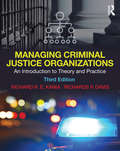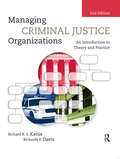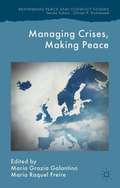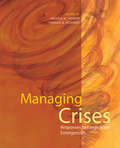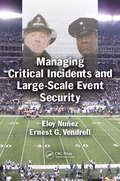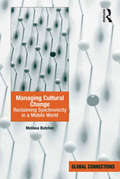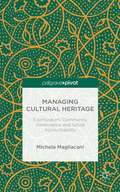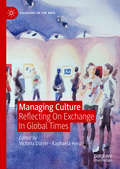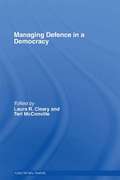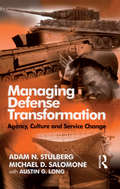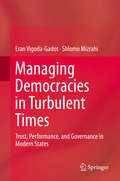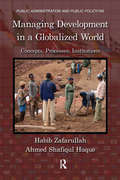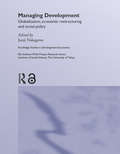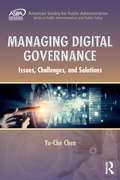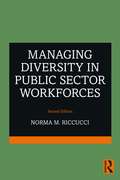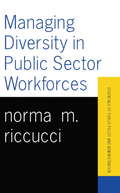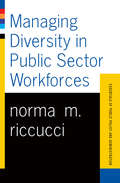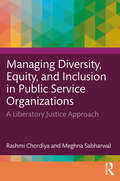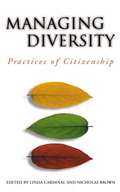- Table View
- List View
Managing Criminal Justice Organizations: An Introduction to Theory and Practice
by Richards P. Davis Richard R.E. KaniaManaging Criminal Justice Organizations: An Introduction to Theory and Practice, 3rd Edition, covers the formal and informal nature of the organizations involved in criminal justice. Kania and Davis provide an introduction to the administration, organization, and management of criminal justice organizations. This management aspect is the key to ensuring the proper running of criminal justice agencies in their efforts to combat crime. The book begins by discussing the eight principles of public management: leading, organizing, deciding, evaluating, staffing, training, allocating, and reporting. It then describes management positions in criminal justice. These include police and law enforcement management; managing the prosecution of criminal suspects; managing bail, bond, and pretrial detention services; managing victim and witness services; managing the judicial system; and managing adult corrections. The remaining chapters cover the pioneers and predecessors of modern public service management theory; leadership in criminal justice; bureaucracies and organizational principles; decision making and planning; performance evaluation, appraisal , and assessment; staffing and personnel issues; training and education for criminal justice; allocation of organizational resources; information management and organizational communications; and future issues in criminal justice management. This text is suitable for introductory criminal justice management courses, preparing students to work in law enforcement, corrections, and the courts. The companion website offers case studies, test banks, lecture slides, and handouts, exercises and forms for use in class.
Managing Criminal Justice Organizations: An Introduction to Theory and Practice
by Richards P. Davis Richard R.E. KaniaThis book studies the formal and informal nature of the organizations involved in criminal justice. It will acquaint readers with the historical developments and application of managerial theories, principles, and problems of managing criminal justice organizations. Covers management positions in criminal justice, historical antecedents, decisionmaking and planning, staffing and personnel, training and education.
Managing Crises, Making Peace
by Maria Raquel Freire Maria Grazia GalantinoThe EU has increased its commitment in response to crises, however, in the face of new threats and emerging crises, its capacity to build a distinctive role in crisis management remains problematic. Resurging divergences in major member states' positions, requiring dual adaptation of the EU level of governance with the national projection of interests, are posing a serious challenge to the objective of a more integrated European defense and security strategy. This collection offers valuableinsights for understanding how a distinctive EU vision on peace missions has emerged and whether it is there to last. Bringing an innovative perspective to European Union engagement in peace operations, this volume combines theoretical reflection with the analysis of empirical case studies that illustrate not only the EU's action in the framework of its Common Security and Defense Policy (CSDP), but also how it engages with other actors in the field including international organisations, non-governmental organisations and local citizens.
Managing Crises: Responses to Large-Scale Emergencies
by Herman B. Leonard Arnold M. HowittFrom floods to fires, tornadoes to terrorist attacks, governments must respond to a variety of crises and meet reasonable standards of performance. What accounts for governments’ effective responses to unfolding disasters? How should they organize and plan for significant emergencies? With fifteen adapted Kennedy School cases, students experience first-hand a series of large-scale emergencies and come away with a clear sense of the different types of disaster situations governments confront, with each type requiring different planning, resourcing, skill-building, leadership, and execution. Grappling with the details of flawed responses to the LA Riots or Hurricane Katrina, or with the success of the Incident Management System during the Pentagon fire on 9/11, students start to see the ways in which responders can improve capabilities and more adeptly navigate between technical or operational needs and political considerations.
Managing Crises: Responses to Large-Scale Emergencies
by Herman B. Leonard Arnold M. HowittFrom floods to fires, tornadoes to terrorist attacks, governments must respond to a variety of crises and meet reasonable standards of performance. What accounts for governments’ effective responses to unfolding disasters? How should they organize and plan for significant emergencies? With fifteen adapted Kennedy School cases, students experience first-hand a series of large-scale emergencies and come away with a clear sense of the different types of disaster situations governments confront, with each type requiring different planning, resourcing, skill-building, leadership, and execution. Grappling with the details of flawed responses to the LA Riots or Hurricane Katrina, or with the success of the Incident Management System during the Pentagon fire on 9/11, students start to see the ways in which responders can improve capabilities and more adeptly navigate between technical or operational needs and political considerations.
Managing Critical Incidents and Large-Scale Event Security
by Eloy Nuñez Ernest G. Vendrell2017 Award Winner of the ASIS Security Book of the Year Nuñez and Vendrell aim to provide the most current and effective resources for managing special events and critical incidents. Their book relies heavily on case studies and after action reports that examine the lessons learned from a multitude of previous events and incidents. In addition, the text identifies and examines best practices and recommended approaches, providing the reader with a variety of checklists and planning tools.
Managing Cultural Change: Reclaiming Synchronicity in a Mobile World (Global Connections Ser.)
by Melissa ButcherDespite decades of policy interventions and awareness raising programmes, migration and mobility continue to give rise to tensions and questions of how to live together in a culturally diverse world. Managing Cultural Change takes a new approach to these challenges, re-examining responses to migration and mobility as part of a process of managing wider cultural change. Presenting research from a range of settings, from liberalising India, global workplaces in Asia, and migrant youth culture in Sydney, this book explores the manner in which cultural change disturbs established frames of reference. In considering affective responses to these liminal moments of disruption, it argues that adaptive strategies such as 'demarcating difference' and 're-placing home', that is, reasserting belonging, are deployed in order to reclaim a sense of synchronicity within the self and with a transforming external environment. With attention to the prevalence and durability of the processes and tensions inherent in cultural change, the author also examines the intercultural, or cosmopolitan, competencies developed in interaction with difference, and whether it is possible to 'teach' people these skills in order to re-find 'cultural fit' and manage change in a constantly shifting world. Contributing to research on transnational migration and mobility studies, while developing the use of conceptual tools such as 'cultural fit' and 'liminality', Managing Cultural Change will be of interest to sociologists, geographers and anthropologists working in the fields of globalisation, migration and transnational communities, ethnicity and identity, belonging and cosmopolitanism.
Managing Cultural Heritage: Ecomuseum, Community Governance and Social Accountability
by Michela MagliacaniManaging Cultural Heritage explores managerial and governance issues within the cultural heritage sector, with particular regard to the ecomuseum. Moreover, a social accountability model is supplied to ecomuseums in order to be accountable towards its shareholder, the local community.
Managing Culture: Reflecting On Exchange In Global Times (Sociology of the Arts)
by Raphaela Henze Victoria DurrerThis book provides new insights into the relationship of the field of arts and cultural management and cultural rights on a global scale.Globalisation and internationalisation have facilitated new forms for exchange between individuals, professions, groups, localities and nations in arts and cultural management. Such exchanges take place through the devising, programming, exhibition, staging, marketing, and administration of project activities. They also take place through teaching and learning within higher education and cultural institutions, which are now internationalised practices themselves. With a focus on the fine, visual and performing arts, the book positions arts and cultural management educators and practitioners as active agents whose decisions, actions and interactions represent how we, as a society, approach, relate to, and understand ourselves and others. This consideration of education and practice as socialisation processes with global, political and social implications will be an invaluable resource to academics, practitioners and students engaging in arts and cultural management, cultural policy, cultural sociology, global and postcolonial studies.
Managing Cyber Attacks in International Law, Business, and Relations
by Jd Scott J. ShackelfordThis book presents a framework to reconceptualize internet governance and better manage cyber attacks. It examines the potential of polycentric regulation to increase accountability through bottom-up action. It also provides a synthesis of the current state of cybersecurity research, bringing features of cyber attacks to light and comparing and contrasting the threat to all relevant stakeholders. Throughout the book, cybersecurity is treated holistically, covering issues in law, science, economics and politics. This interdisciplinary approach is an exemplar of how strategies from different disciplines as well as the private and public sectors may cross-pollinate to enhance cybersecurity. Case studies and examples illustrate what is at stake and identify best practices. The book discusses technical issues of Internet governance and cybersecurity while presenting the material in an informal, straightforward manner. The book is designed to inform readers about the interplay of Internet governance and cybersecurity and the potential of polycentric regulation to help foster cyber peace.
Managing Defence in a Democracy (Cass Military Studies)
by Laura R. Cleary Teri McConvilleAlthough each state is unique it is possible to identify certain common problems and issues with respect to defence governance and management. Governance and Management of Defence is a unique introduction to all the key principles of governance and management through the clear identification of these commonalities. The leading contributors that this volume brings together also show that if individuals are keen to reform practices within their defence establishments they need to be aware of the many constraints and obstacles that may challenge their endeavours. Each contributor is an acknowledged expert in their field and identifes examples of good practice from across the world and the steps taken to implement that practice. This new volume work supports teaching with accessible prompts for reflective activity. The editors recognize that many readers will not be native English speakers, so plain English is used throughout with international examples and case studies to make all the topics and themes clearly relevant and understandable. This is the ideal introductory text for any course that deals with management within the defence sector This book will be of great interest to all students of armed forces and defence management, politics and strategic and military studies.
Managing Defense Transformation: Agency, Culture and Service Change
by Adam N. Stulberg Michael D. SalomoneWhy are some military organizations more adept than others at reinventing themselves? Why do some efforts succeed rapidly while others only gather momentum over time or become sidetracked or even subverted? This book explicates the conditions under which military organizations have both succeeded and failed at institutionalizing new ideas and forms of warfare. Through comparative analysis of some classic cases - US naval aviation during the interwar period; German and British armour development during the same period; and the US Army's experience with counter-insurgency during the Vietnam War - the authors offer a novel explanation for change rooted in managerial strategies for aligning service incentives and norms. With contemporary policy makers scrambling to digest the lessons of recent wars in Kosovo, Afghanistan and Iraq, as well as to meet the unfolding challenges of the new revolution in military affairs (RMA), understanding the sources and impediments to transformation has become critical.
Managing Democracies in Turbulent Times
by Eran Vigoda-Gadot Shlomo MizrahiThis book discusses some of the main challenges that arise in the management of modern democracies, with a focus on the role of citizens and their perceptions of government. A theoretical and practical framework is suggested for dealing with some of the most urgent problems that governments face today: the balance between bureaucracy and democracy and between political and administrative concerns; the pressing economic concerns in a market-based, globalized knowledge society and the changes in the relationship of trust amongst the players. At the heart of the analysis is the idea that running governments effectively means settling the potential conflicts between all those who are involved in the governmental process and in the making of public policy and public actions. The authors suggest approaches for strengthening the trust in democratic institutions and cooperation between the main actors in the democratic sphere, without compromising on the need to ensure effective governance.
Managing Development in a Globalized World: Concepts, Processes, Institutions (Public Administration and Public Policy)
by Ahmed Shafiqul Huque Habib ZafarullahTraditionally, development has been rooted in ideologies and assumptions prevalent in the developed world and in practices and strategies adopted by leading industrial nations. However, historically, eclectic ideas and approaches often clash with existing long-established notions of progress and modes of realizing social and economic change. Managing Development in a Globalized World: Concepts, Processes, Institutions explores this topic by incorporating ideas and interpretations that have previously been neglected or given inadequate attention in the discourse on developing countries. It underscores development as a continuous process that must be supported by sound policies and efficient management, supplying a wider understanding of the field. The authors argue that the application of innovative development techniques and best practices is essential for obtaining optimum results in meeting the needs of society. They examine the style of managing development with a new perspective that links the phenomenon with changing demands and the interplay of internal/external actors and a host of stakeholders. An exploration of key sectors in development provides clear comprehension of problems and solutions. A careful synthesis of theoretical/conceptual and empirical literature, the book assesses real-world situations and provides insight into the operational dynamics of development policies, programs, and institutions. It focuses on goals, values, and dynamics of development management that are undergoing rapid changes and continue to be enhanced to alleviate poverty and improve living standards in an era of globalization and inter-regional and inter-institutional synergies. It highlights best practices essential for the efficient and effective delivery of human development services that are designed and put in place to obtain optimum results in meeting the needs of society.
Managing Development: Globalization, Economic Restructuring and Social Policy (Routledge Studies in Development Economics)
by Junji NakagawaGlobalization in the 1990s provided both opportunities and challenges for developing and transition economies. Though for some, it offered the chance to achieve economic growth through active involvement in the integrated and liberalized world economy, it also increased their vulnerability to external shocks and volatility. As a consequence, stakeholders at every level of the development and transition process – international organizations, national governments and the private sector – had to review their strategies in order to adjust to the new world economic environment. As the Mexican peso crisis of 1994-1995 and the Asian financial crisis of 1997-1998 showed dramatically, the cost of maladjustment was not only very high but it also affected many more stakeholders than before, due to the contagious effects of crises. This revealing book analyzes the different methods employed to manage globalization and development. Bringing together an international team of contributors, including Barbara Stallings, Alicia Giron and J. C. Ferraz, it will prove to be a valuable resource for those involved in the fields of development economics and political economy.
Managing Digital Governance: Issues, Challenges, and Solutions (ASPA Series in Public Administration and Public Policy)
by Yu-Che ChenManaging Digital Governance provides public administrators with a comprehensive, integrated framework and specific techniques for making the most of digital innovation to advance public values. The book focuses on the core issues that public administrators face when using information and communication technologies (ICTs) to produce and deliver public service, and to facilitate democratic governance, including efficiency, effectiveness, transparency, and accountability. Offering insight into effectively managing growing complexity and fragmentation in digital technology, this book provides practical management strategies to address external and internal challenges of digital governance. External challenges include digital inclusiveness, open government, and citizen-centric government; internal ones include information and knowledge management, risk management for digital security and privacy, and performance management of information technologies. Unique in its firm grounding in public administration and management literature and its synergistic combination of theory and practice, Managing Digital Governance identifies future trends and ways to develop corresponding capacity while offering enduring lessons and time-tested digital governance management strategies. This book will serve as an invaluable resource for students, scholars, and practitioners in public administration, management, and governance who aspire to become leaders equipped to leverage digital technologies to advance public governance.
Managing Diversity In Public Sector Workforces
by Norma M. RiccucciPublic and private sector workforces in the U.S. look very different today than they did even 25 years ago. The changes are having a significant effect on how organizations manage their workforces. The old styles of managing heterogeneous workforces are proving to be ineffectual, and so management strategies aimed at embracing diversity and inclusion are essential. These strategies can have positive implications for worker satisfaction, morale and – ultimately – the delivery of public services to the American people. Managing Diversity in Public Sector Workforces, Second Edition examines demographic changes to the U.S. labor force and workplace and the ways in which government employers are managing the diverse populations that now fill public sector jobs. Addressing specific management strategies and initiatives relied on by public sector employers, as well as the implications of effectively managing variegated workforces for the overall governance of American society, this book demonstrates the importance of ensuring that programs to promote inclusiveness and diversity that appear on paper are carried through to practice through implementation. The book begins with a review of equal employment opportunity and affirmative action and the extent to which EEO and AA are still relied upon in the workplace. It then examines law and other public policy issues surrounding EEO, AA and diversity management. The remainder of the book focuses on the core of managing diversity in the public sector, exploring the initiatives, strategies, and programs that government employers either do or might rely on to ensure that the demographic mosaic embodied by their workforces is prepared to meet the needs and interests of the American citizenry of the 21st century. Data are provided on the demographics of the federal, state and local government workforces. Separate chapters address each of the following aspects of diversity: race, ethnicity, gender, LGBTQ employment, physical ability, and the intersection of these constructs. Managing Diversity in Public Sector Workforces, Second Edition will be of interest to students of public administration and public personnel management, and it is essential reading for all those involved in managing public organizations.
Managing Diversity In Public Sector Workforces
by Norma RiccucciAs we enter the twenty-first century, America’s workforce looks markedly different than it ever has before. Compared with even twenty years ago, more white women, people of color, disabled persons, new and recent immigrants, gays and lesbians, and intergenerational mixes now work in America. The way in which government employers embrace this opportunity of diversity will clearly distinguish effective and efficient organizations from those which are unproductive and unable to meet the demands and necessities of the American people in the new century. This book addresses the demographic changes to the labor force and workplace and the ways in which government employers are managing the imminently diverse populations that now fill public sector jobs. It addresses the specific management strategies and initiatives relied upon by public sector employers as well as the implications of effectively managing variegated workforces for the overall governance of American society.
Managing Diversity In Public Sector Workforces
by Norma RiccucciAs we enter the twenty-first century, America's workforce looks markedly different than it ever has before. Compared with even twenty years ago, more white women, people of color, disabled persons, new and recent immigrants, gays and lesbians, and intergenerational mixes now work in America. The way in which government employers embrace this opportunity of diversity will clearly distinguish effective and efficient organizations from those which are unproductive and unable to meet the demands and necessities of the American people in the new century.This book addresses the demographic changes to the labor force and workplace and the ways in which government employers are managing the imminently diverse populations that now fill public sector jobs. It addresses the specific management strategies and initiatives relied upon by public sector employers as well as the implications of effectively managing variegated workforces for the overall governance of American society.
Managing Diversity In Public Sector Workforces
by Norma RiccucciAs we enter the twenty-first century, America’s workforce looks markedly different than it ever has before. Compared with even twenty years ago, more white women, people of color, disabled persons, new and recent immigrants, gays and lesbians, and intergenerational mixes now work in America. The way in which government employers embrace this opportunity of diversity will clearly distinguish effective and efficient organizations from those which are unproductive and unable to meet the demands and necessities of the American people in the new century. This book addresses the demographic changes to the labor force and workplace and the ways in which government employers are managing the imminently diverse populations that now fill public sector jobs. It addresses the specific management strategies and initiatives relied upon by public sector employers as well as the implications of effectively managing variegated workforces for the overall governance of American society.
Managing Diversity In Public Sector Workforces: Essentials Of Public Policy And Administration Series (Essentials Of Public Policy And Administration Ser.)
by Norma RiccucciAddresses increased diversity in government work forces, and management strategies appropriate for managing diversity. Today, public employers are poised to create productive work forces that are represented of the global population. . As we enter the twenty-first century, Americas workforce looks markedly different than it ever has before. Compared with even twenty years ago, more white women, people of color, disabled persons, new and recent immigrants, gays and lesbians, and intergenerational mixes now work in America. The way in which government employers embrace this opportunity of diversity will clearly distinguish effective and efficient organizations from those which are unproductive and unable to meet the demands and necessities of the American people in the new century. This book addresses the demographic changes to the labor force and workplace and the ways in which government employers are managing the imminently diverse populations that now fill public sector jobs. It addresses the specific management strategies and initiatives relied upon by public sector employers as well as the implications of effectively managing variegated workforces for the overall governance of American society.
Managing Diversity in the Military: Research Perspectives from the Defense Equal Opportunity Management Institute
by Mickey R. DansbyAlthough diversity is a twentieth-century term, as the United States continues through the twenty-first century, the issue of diversity in society and in organizations is becoming more complex. Managing Diversity in the Military addresses current equal opportunity and diversity issues and explores how the military is attempting to resolve them.The research presented reflects interests of scholars from various backgrounds who use different models, approaches, and methodologies, many of which are adapted from the study of civilian institutions. The work is divided into five sections ""Contemporary Approaches to Managing Diversity,"" ""Diversifying Leadership: Equity in Evaluation and Promotion,"" ""Gender Integration and Sexual Harassment,"" ""Military Discipline and Race,"" and ""Where Do We Go from Here?"" which proposes future research directions for equal opportunity and diversity management in the armed forces.All of the areas explored in this accessibly written volume have counterparts in the civilian sector. The book offers insights, practical methodologies, and effective management guidelines for commanders, civilian-sector executives, and human resource practitioners responsible for equal opportunity programs and outcomes. This is now the standard social research tool in an area of profound practical concerns.
Managing Diversity, Equity, and Inclusion in Public Service Organizations: A Liberatory Justice Approach
by Meghna Sabharwal Rashmi ChordiyaManaging Diversity, Equity, and Inclusion in Public Service Organizations: A Liberatory Justice Approach is a textbook designed to facilitate critical and courageous conversations that recognize our differences, including our privileged and marginalized social identities, and engage readers in the principles and practice of solidarity to transform systems of oppression. Examining dimensions of race, gender, sexual orientation, disabilities, and their intersectionality in the context of diverse, multigenerational organizations, this leading-edge new textbook redefines and reimagines the role of public service in fostering meaningful, authentic, sustainable, and transformative change.While diversity is now a standard topic in books on public personnel and human resource management, authors Rashmi Chordiya and Meghna Sabharwal offer a deeper, nuanced, and reflective understanding of many of the systematic and often covert ways in which marginalized and minoritized groups can face barriers to full and equal participation in decision-making, access to resources, and opportunities for advancement and growth. Taking a holistic, liberatory public service approach, the book explores what it would mean if public service systems were reimagined, and goals aligned and transformed, to serve an “all means all” public.Other unique features of this book include developing a nuanced understanding of trauma of oppression from neurobiological, sociological, and historical perspectives. This book supports the reader in exploring ways of cultivating individual and organizational competencies and capacities for envisioning and implementing trauma-informed, repair and healing-centered approaches to public service that compassionately center the margins. To encourage learner engagement and to connect theory to practice, this book offers several case studies. Each chapter contains a description of big ideas, big questions, and key concepts and teachings offered in that chapter, as well as chapter summaries and deep dive resources. Throughout the book, the authors offer boxed invitations to pause and use reflective prompts to engage readers with the core concepts and key teachings of the book. Managing Diversity, Equity, and Inclusion in Public Service Organizations is required reading for all current and future public administrators and nonprofit leaders.
Managing Diversity: Practices of Citizenship (Governance Series)
by Nicholas Brown Linda CardinalAustralia, Canada, and Ireland are all engaged in questions of multiculturalism and in the politics of recognition and reconciliation, the opportunities and pressures of geographic regionalism, shifts in political agendas associated with the impact of neo-liberalism, and moves to frame political agendas less at the macro-level of state intervention and more at the level of community partnership and empowerment. In related but distinct ways, each state is being challenged to devise policies and offer outcomes that address an unfolding and unsteady synthesis of issues relating to citizenship, the role of nation-states in a 'borderless' world, and the management of economic change while preserving an enabling sense of national identity and social cohesion.Analyzing issues ranging from urban planning and the provision of broadcasting services for minority languages, to principled debates over basic rights and entitlements, these essays offer penetrating summaries of each political culture while also prompting comparative reflection on the broad theme of "democracy and difference."
Managing Domestic Dissent in First World War Britain (British Politics and Society)
by Brock MillmanThe author argues that the way the British Government managed dissent during World War I is important for understanding the way that the war ended. He argues that a comprehensive and effective system of suppression had been developed by the war's end in 1918, with a greater level in reserve.
